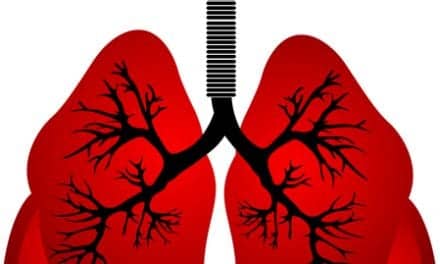Lung Cancer Rate Higher in Fibrotic Lung Disease Patients
The incidence of lung cancer is markedly increased in patients with cryptogenic fibrosing alveolitis, independent of smoking history, according to a study published in the January issue of the American Journal of Respiratory and Critical Care Medicine. In this illness of unknown origin, the tiny air sacs of the lung (alveoli) become inflamed and their walls thicken, causing the lungs to become less elastic and efficient. In fibrosing alveolitis, the body’s defenses produce antibodies against its own lung tissue and alveoli wall damage often progresses despite treatment.
Richard Hubbard, MD, of the Division of Respiratory Medicine, Nottingham University, Nottingham, United Kingdom, together with three associates, examined patient data from 890 persons with cryptogenic fibrosing alveolitis, as well as data from a 5,884-person control group of the same age and sex. For those with alveolitis, the median age was 71, with 62% being male. The cases in this study came from the United Kingdom General Practice Research Database, the largest primary care population database in the country. The researchers found 53 cases of lung cancer in the control group (0.9% rate). In the fibrosing alveolitis study group, there were 39 cases of lung cancer (4% rate). The higher ratio of lung cancer in fibrosing alveolitis patients was independent of smoking history and showed no evidence of interaction with age or sex.
“Investigators have speculated that chronic inflammation in the lung produces extensive DNA damage, leading to an overexpression and mutations of the p53 gene resulting in cancer,” Hubbard says. “But further research is needed to determine the precise mechanisms that lead to the dramatic increase in lung cancer.”
Conference Offers Holistic Approach to Asthma
A daylong conference, “New Concepts in Asthma Management,” will be held at William Paterson University in Wayne, NJ, on May 12, 2000. The focus of this conference will be managing asthma through holistic methods that could diminish the overuse of medication. The cost is $9 and includes lunch and instructional materials. Registration begins at 8:30 am, and the conference starts at 9:30 with a keynote speech by Betsy Thomason, RRT, who will present “Asthma and the Art and Science of Breathing.” Workshops will be held from 10:30 am to 11:45 am and again from 1:00 pm to 2:15 pm. Topics to be discussed include: nutritional and herbal support for asthma; stress management for children; and nondrug therapies for asthma. A panel discussion, which will include a question and answer session, will be held from 2:15 pm to 2:45 pm, followed by a wrap-up and evaluation session. William Paterson’s Center for Continuing Education and Distance Learning (CEDL), Department of Exercise and Movement Science, and Health and Fitness Outdoors Inc are sponsoring the event. For additional information, call CEDL at (973) 720-2354.
| ARCF Announces Winners of Education Recognition Awards The American Respiratory Care Foundation (ARCF) has announced the winners of the ARCF Education Recognition Awards. They are as follows: Morton B. Duggan, Jr, Memorial Education Recognition Award Jimmy A. Young Memorial Education Recognition Award NBRC/AMP William W. Burgin, Jr, MD, Education Recognition Award NBRC/AMP Robert M. Lawrence, MD, Education Recognition Award William F. Miller, MD, Postgraduate Education Recognition Award NBRC/AMP Gareth B. Gish, MS, RRT, Memorial Postgraduate Education Recognition Award For more information on awards and grants available through the ARCF, contact Norma Hernandez of the ARCF Executive Office, 11030 Ables Lane, Dallas, TX 75229; email: [email protected], (972) 243-2272, (972) 484-2720 (fax). |
PSRC Holds Third Annual Conference
The Pennsylvania Society for Respiratory Care (PSRC) Third Annual Eastern Regional Conference & Exhibition, titled “Diversity, Dimension, Design 2000,” will be held April 13 and 14, 2000 at the Holiday Inn, King of Prussia, Pa. The conference has become the largest in the state and promises not to disappoint its attendees. The PSRC Education Committee has been busy forming a program that covers topics including critical care, pediatrics, sleep studies, and back-to-basics. Speakers will include the American Association for Respiratory Care’s current president, Garry Kauffman, MPA, RRT, as well as William Malley, MS, RRT.
The annual Sputum Bowl will be held again this year but with a slight change—teams may include practitioners, educators, and students. An award-winning comedian will also be on hand for entertainment.
For more information, contact Angie Herstine at (609) 784-0340.
Link Between Sleep-Related Breathing Disorder and Hypertension Confirmed
A recent study in the American Journal of Respiratory and Critical Care, confirmed that sleep-related breathing problems are an independent risk factor for high blood pressure. The study of 1,190 patients seen at a sleep disorders center in Marburg, Germany, found that the severity of a person’s sleep-related breathing disorder corresponded to the risk of high blood pressure, or hypertension. The risk of hypertension was greatest in people with sleep-related breathing problems who were age 50 and younger.
According to lead researcher Ludger Grote of Sahlgrenska University Hospital in Gothenburg, Sweden, the study results point to the need for patients with sleep-related breathing problems to have their blood pressure checked, and for hypertension patients to be evaluated for clinical signs of sleep-related breathing problems. He notes that the exact influence of sleep-related breathing problems on blood pressure development is still unknown.
For such patients, a physician may recommend testing for obstructive sleep apnea (OSA), which affects up to 4% of the adult population. Treatment for OSA may include weight loss, changes in sleep position, and avoidance of alcohol and certain medications. Other possible treatments include continuous positive airway pressure or surgery.
For more information on sleep apnea, call the American Lung Association at (800) LUNG-USA.
| Capitol Hill Agrees That RTs May Be the Most Qualified to Give Respiratory Care Capitol Hill has agreed with the American Association for Respiratory Care (AARC) that Medicare beneficiaries may be facing unnecessary life or death situations in skilled nursing facilities (SNFs). This can happen every time they receive respiratory services from health care providers who are not respiratory therapists and therefore do not have to document their competency to deliver respiratory services.
The act states that “there is some evidence suggesting that the quality of respiratory care provided to Medicare beneficiaries in skilled nursing facilities is varied and, in some cases, inadequate.” AARC executive director Sam Giordano says much of this “evidence” came by way of the AARC’s recently released outcomes study. That study showed, for example, that lung patients who received care from a respiratory therapist in a SNF had a 42% lower death rate than those patients cared for by other, lesser-skilled health care providers. The refinement plan also helps respiratory patients by allowing for a temporary payment increase for certain high-cost Medicare patients. The federal per diem PPS reimbursements increase by 20% for 15 categories of Medicare patients in SNFs starting April 1, 2000 and federal rates will increase by 4% for all categories of patients in FY2001 and FY2002. “The results of the study show beyond doubt that there is a difference in quality and cost of care when it is given by respiratory therapists,” Giordano says. “It’s good to see Capitol Hill concerned about this issue.” |
Kaiser Permanente Says Good-Bye to Smoking
Effective January 1, Kaiser Permanente has banned smoking from all of its Southern California medical centers and facilities, becoming the first major health care organization in the country to adopt such a policy. Today’s announcement fittingly coincides with the annual Great American Smoke-Out.
The SmokeFree 2000 policy will prohibit indoor or outdoor smoking on any Kaiser Permanente-owned property. The policy will affect all 12 medical centers in Southern California and their affiliated clinics, administrative offices, and warehouses. Kaiser Permanente buildings and offices throughout Southern California have not allowed smoking since 1991, allowing smokers to light up only in designated outdoor areas. The Kaiser Permanente medical centers in Fontana and Riverside have been totally smoke-free since 1996.
By eliminating smoking from its campuses, the health care providers of Kaiser Permanente are sending a clear message that smoking is an unacceptable health behavior that both smokers and nonsmokers must address. “We are all part of this problem,” says Gary Wong, MD, physician coordinator for preventative care and smoking cessation for Kaiser Permanente in Southern California. “We need to do all we can to get smokers to stop. The idea is to promote health.
“Allowing smoking in specific areas has conveyed a mixed message that it is acceptable to smoke as long as it is somewhere else. We are unequivocal in our view that smoking is a dangerous habit,” Wong says.
Kaiser Permanente’s SmokeFree 2000 campaign will install signs, banners, and posters announcing the new policy at its facilities, and staff will be encouraged to politely inform members and coworkers about the no-smoking rule. If a smoker refuses to comply, security will be summoned and a formal warning may be issued. People can smoke off campus.
The intent of SmokeFree 2000 is to encourage no smoking, not to punish smokers. Giving up the habit is difficult, even though surveys have shown that 70% of smokers actually want to stop. “Saying no to even one cigarette can be a positive first step to stopping smoking,” Wong says.


 Congress has signed off on a Medicare refinement plan that could eventually provide for the requirement of respiratory certification or competency testing for any health care provider giving respiratory services to Medicare beneficiaries in SNFs. Specifically, the act calls for a study of the competency of providing such care.
Congress has signed off on a Medicare refinement plan that could eventually provide for the requirement of respiratory certification or competency testing for any health care provider giving respiratory services to Medicare beneficiaries in SNFs. Specifically, the act calls for a study of the competency of providing such care. 







